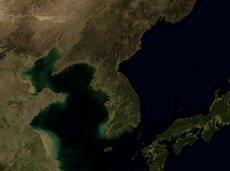United Nations Security Council Resolution 82
| UN Security Council Resolution 82 |
|
|---|---|

Satellite view of the Korean Peninsula
|
|
| Date | June 25 1950 |
| Meeting no. | 473 |
| Code | S/1501 (Document) |
| Subject | Complaint of aggression upon the Republic of Korea |
|
Voting summary
|
9 voted for None voted against 1 abstained 1 absent |
| Result | Adopted |
| Security Council composition | |
|
Permanent members
|
|
|
Non-permanent members
|
|
United Nations Security Council Resolution 82 was a measure adopted by the United Nations Security Council (UNSC) on June 25, 1950. The resolution demanded North Korea immediately end its invasion of South Korea, the catalyst for the beginning of the Korean War. The measure was adopted by a vote of 9 support, none opposed, and one abstention.
The Korean Peninsula had been divided between occupation forces of the United States and the Soviet Union since the end of World War II along the 38th Parallel. Each government sought to prop up a government on its side of the occupation border, and as the Cold War began, tensions rose between the two Koreas. These culminated in open warfare with the North's invasion of the South on June 25. During this time, the United Nations backed South Korea and considered it the only lawful government.
The resolution called on the North to immediately halt its invasion and to move its troops back to the 38th parallel. Seen as a diplomatic victory for the United States, the resolution was completely ignored by North Korea. This brought the UN and the US to take further action, setting the state for massive international involvement and the expansion of the Korean War.
At the end of World War II, the Korean Peninsula, which up to that point had been occupied by the Empire of Japan, was divided along the 38th Parallel. To the north, the Soviet Union (USSR) occupied the country, which established itself as a communist state, the Democratic People's Republic of Korea under Kim Il Sung. To the south, the United States (US) occupied the country, establishing the Republic of Korea under an anti-communist leader, Syngman Rhee. As tensions rose between the US and the USSR, each government in Korea claimed it had sovereignty over the whole country.
...
Wikipedia
